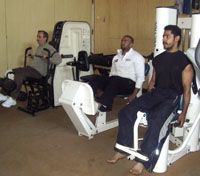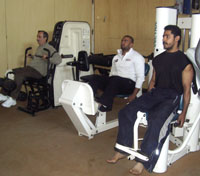
Sana’a beauty centers: business and therapy [Archives:2006/918/Health]
February 6 2006
 |
Amel11ariqi@yahoo.com
The spread of beauty centers offering cosmetic services and products in Sana'a has become a remarkable phenomenon. Some centers recently have begun providing their mostly female customers treatments and products dealing with skin problems, obesity and even some disfigurement problems. Although such centers are outside Ministry of Health monitoring, beauty center owners insist that Yemenis long for such services because they are needed.
For women only
A Hadda Street beauty center, owned and operated by a Yemeni and his Philippine wife, provides customers cosmetic services such as cleaning, softening, protecting and coloring hair, skin, nails, lips and eyes.
“Our customers are women. We don't allow any male to enter the center unless he is under age 10,” the owner noted. Also, employees are women of different nationalities. “We respect customers' privacy, so I hired women to offer these services. The only men you see are me and a boy and we work in the cafe outside the center,” he added.
The center also contains a section with many exercise machines and equipment. Hind from Egypt said such equipment is important to keep the body fit. She said many women experience obesity or miss their previous body shape after giving birth, so they come to the center and follow diets and a nutrition system she prescribes for them in addition to exercise.
“I ask the customer to follow a particular nutrition and exercise program according to her situation, health and need,” she said. “It is important for me to know the customer's medical history and background. For example, if the customer has suffered heart disease, I have to consider this in her program,” she added. According to the owner, customers vary in age and nationality. “Yemeni women make up the largest number of our customers,” he added.
The beauty center also has a small outside cafe where fast food, hot and cold drinks and shisha are provided. The owner commented that such services aim to satisfy customers, although such services may be against the regime they customer are following. “In the end, it is business,” he said.
An Australian woman who refused to be photographed expressed her satisfaction of services offered at the beauty center. “It is the only center I use when I come to Sana'a,” she said. Another customer said she comes often to use the exercise equipment to maintain her fitness and energy.
Physical therapy
Amjed from Iran also directs a Hadda Street beauty center. He mentioned that the center was established mainly to offer medical and cosmetic services. However, he could not get permission from the Ministry of Health; therefore, it has become a tourist center. “Unfortunately, Yemenis have no idea about the medical center concept. They don't know the importance of the services such a center may offer. What they want is only a place to chew qat and smoke,” he said.
Although the center has no Ministry of Health authorization, it offers physical therapy to several customers. Fatima has two or three weekly physical therapy sessions at the center. “I got a blood clot in one of my legs and I had an operation in Sana'a,” she said. “After the operation, my doctor sent me to this center to get physical therapy. I have been treated here for seven months. I feel much better,” she added.
Raad had surgery in Jordan on his upper spine. “When I came back, a doctor sent me to this center to rehabilitate my spine,” he said.
Saddam, the center's physical therapy supervisor, said he previously worked in a physical therapy center where he was trained to use it for patients. He pointed out the importance of the beauty center's exercise machines in treating customers. “Our customers, whether men or women, use such machines to rebuild and rejuvenate their damaged limbs,” he said.
Expert and laser
“We are distinguished by the expensive modern equipment we use to provide customers with perfect, healthy care for their skin or hair,” said Abdulkarim, another center owner. He stated that the center's international cosmetics cannot be found in Yemeni markets. “We also use laser and a machine that produces water vapor to cure skin problems,” he said.
Rima Kammel from Lebanon is an expert, having worked in this field for eight years. She said the beauty center's customers are Yemeni women between the ages of 15 and 45, adding that it also receives women of different nationalities. “A skin cleaning session costs between 5,000 YR (about $25) and 8,000 YR (about $28). Customers usually need one to six sessions monthly,” she added.
“The main skin problems Yemeni women suffer are tan or brown skin, peeling and acne,” she said. “We refuse to treat skin with any kind of infection. We ask customers to see a doctor first,” she added.
Absent Ministry of Health
Surgeon Dr. Marwan Ali said beauty center owners are merely traders. According to Ali, the Ministry of Health should be responsible for observing and monitoring activities inside such centers. “It's very dangerous for amateurs to give a diet or nutrition program, as an incorrect system threatens the body and will subject it to disease and collapse,” he warned.
He pointed out that those who operate such centers are not Yemenis and that they claim they have the experience and qualifications enabling them to offer such therapy. “Unfortunately, Yemenis – especially women – believe them and go to their centers,” he said.
Physical therapist Dr. Ahmed Almedhwahi said those offering physical therapy in beauty centers are not experts in this regard. “They receive a few months' training course and then claim they are physical therapists. Their concept of physical therapy is a massage,” he said.
According to Almedhwahi, physical therapists must do manual muscle testing, electrical testing, perceptual and sensory testing, as well as measure range of joint motion. Functional activity testing is important to determine patients' ability to perform necessary tasks to care for themselves.
In treating patients, physical therapists may employ one or more of the following procedures: heat treatments using water at various temperatures, melted paraffin wax, infrared and ultraviolet lamps, ultrasonic waves producing heat internally and diathermy (applying electrical current to generate heat in body tissue).
Physical therapy also includes massage, bandaging, strapping and applying and removing splints and casts. Physical therapists also instruct patients and their relatives in exercise techniques.
“The Yemeni concept of physical therapy is not clear, so he or she may pay 2,000 YR or 3,000 YR for a massage session, thinking it is physical therapy; whereas hospital physical therapy would cost 500 YR.”
Almedhwahi confessed that although such therapy is important in rehabilitating the body before and after surgery or in treating disfigurement, Yemen lacks such centers; therefore, Yemenis may turn to beauty centers seeking a cure. “The physical therapy center in Sana'a and maybe two other centers outside Sana'a are the only ones offering physical therapy under Ministry of Health control,” he noted.
Dermatology specialist Dr. Elham Mutahar said it is important that beauty centers employ experts and specialists. “Randomly applying cosmetics will affect the skin and create problems such as spots and wrinkles,” she warned.
Mutahar referred to types of cosmetics available in markets and possibly in beauty centers containing ingredients that harm the skin. “An expert or skin doctor knows such ingredients and their effects upon the skin,” she added.
She said the Ministry of Health and similar authorities must monitor cosmetic products entering Yemen. She also referred to the risk of beauty centers' use of lasers. “An expert is the only one who can use a laser on the skin. Laser misuse may lead to serious consequences like blindness.”
Mutahar concluded, “Whether these beauty centers are for business or therapy, they should be under Ministry of Health supervision.”
——
[archive-e:918-v:14-y:2006-d:2006-02-06-p:health]


